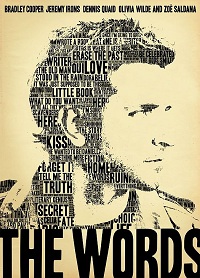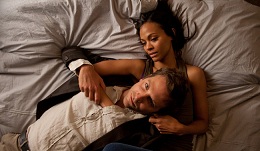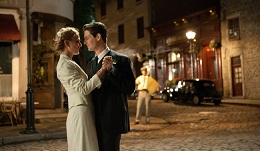 It’s like Inception but with all the fun, action, and humor taken out.
It’s like Inception but with all the fun, action, and humor taken out.
The Words provides stories within stories within stories. After all, why settle on a single plot with one narrator, when three will do?
The film, by directing and screenwriting duo Brian Klugman and Lee Sternthal certainly does its best to fill all the major roles with capable actors, but somehow still comes off as a bland romance novel which never justifies its existence.
Dennis Quaid stars as Clay Hammond, a celebrated author who, as the film opens, is giving a dramatic reading of his latest novel. Clay’s narration introduces and concludes each of the passages as we find ourselves in a world of his imagination invoking yet another author and a story about yet another book.
Bradley Cooper stars as Rory Jansen, the main character in Clay’s novel, a struggling young author with a wife (Zoe Saldana) who is obviously too good for him. Rory has finally hit the big time with his first best seller. The trouble is, Rory didn’t actually write the book that made him famous.
 The screenplay by Klugman and Sternthal is full of contrived cliches, the most glaring of which include Rory’s discovery of an unpublished masterpiece tucked away in an old briefcase bought at an antique shop and the amazing amount of hoops that the script goes through to make Rory likable. It’s all an attempt to sell the audience on the idea that his theft of the book is noble, romantic, and kinda sorta not entirely his fault. It’s mind-boggling the time and effort the screenwriters take to try and offer excuses for his plagiarism.
The screenplay by Klugman and Sternthal is full of contrived cliches, the most glaring of which include Rory’s discovery of an unpublished masterpiece tucked away in an old briefcase bought at an antique shop and the amazing amount of hoops that the script goes through to make Rory likable. It’s all an attempt to sell the audience on the idea that his theft of the book is noble, romantic, and kinda sorta not entirely his fault. It’s mind-boggling the time and effort the screenwriters take to try and offer excuses for his plagiarism.
Of course, Rory’s world is turned upside down by the arrival of yet another author (Jeremy Irons) who is actually responsible for his bestseller, and gives us more narration into yet another level of storytelling as the real author imparts his life story, including his time as a soldier in France (played by Ben Barnes) and his tragic relationship with the woman he loved (Nora Arnezeder), which led to the writing of the mostly autobiographical novel.
 The Words does a fairly good job at balancing and connecting the three separate stories together. However, not all of them are equally important nor do they all serve the overall narrative which makes the entire project feel rudderless at times. The writing over-dramatizes certain moments and clumsily foreshadows other events that would have been better served had the been left to develop more naturally. Nothing in this script develops naturally. And that’s the problem.
The Words does a fairly good job at balancing and connecting the three separate stories together. However, not all of them are equally important nor do they all serve the overall narrative which makes the entire project feel rudderless at times. The writing over-dramatizes certain moments and clumsily foreshadows other events that would have been better served had the been left to develop more naturally. Nothing in this script develops naturally. And that’s the problem.
The inter-cut sequences with Clay’s reading and his wooing of an attractive young graduate student (Olivia Wilde, who is mostly wasted here) aren’t really necessary to the plot. In fact the only reason they exist are to add narration when necessary (lazy writing) or to drive home the point that The Words actually has no message, point, big idea, revelation, or truth to offer (even lazier writing).
Despite several good performances and believable relationships, The Words doesn’t have much to say. In fact, the entire point of the movie can be boiled down into a single sentence: Sometimes good people do bad things and have to live with them. The End. Nor does it have anything to add to the challenges of writing — which audiences have seen done far better in countless other movies.
The Words wants to make a deep emotional impact on the audience while pretentiously offering platitudes and romanticized cliches that are as flimsy as the paper each author uses to type his work. It’s never awful, and at times it’s actually pretty good, presenting some interesting ideas and complex relationships. But, instead of developing and playing these out, the film offers the characters paint-by-number choices and far-too-obvious conclusions.
Almost worse than an easily dismissible, thoroughly awful film, The Words wastes good ingredients (obvious talent, settings, and a strong set-up) to craft a lukewarm microwave dinner dressed up as a three-course meal.
It may look terrific, it may even fool some for a bite or two, but in the end, it’s simply unsatisfying.







Comments on this entry are closed.